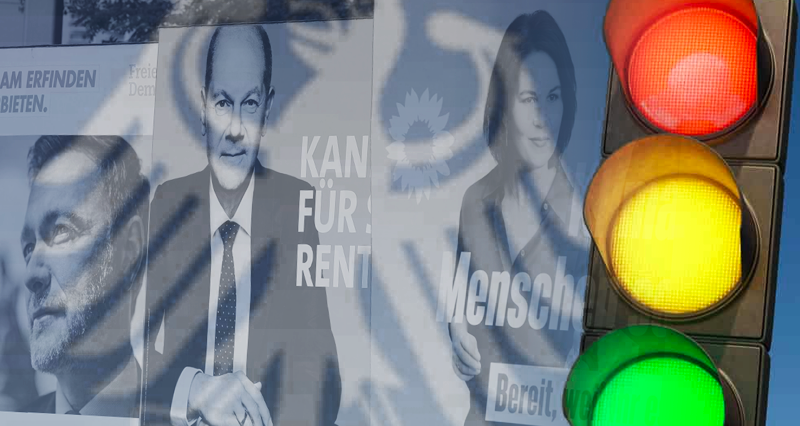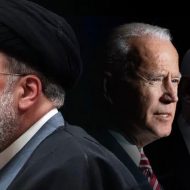“The traffic lights are on”, said Olaf Scholz, candidate of the Social Democratic Party of Germany (SPD) and designated Chancellor of the country. As United World International had predicted back in March 2021, Germany is heading to a coalition government of SPD, the Greens and the Free Democratic Party (FDP), red-green-yellow being the three parties colors.
Following the elections September 26, the three parties started negotiations on a coalition agreement, where a consensus document was developed past week, which the three part basis have ratified over the weekend.
Now, nothing stands in the way anymore for the establishment of the next German government, with the Parliament (Bundestag) choosing the Chancellor on December 8.
The three parties have also decided on the ministerial positions. Besides of the position of Chancellor, the SPD gets the ministries of interior, defense, labor and social security, health, economic cooperation (dedicated to developmental politics) and construction.
The Greens have the oversight of the ministries for foreign affairs, economy and climate change, environment, agriculture and family.
The FDP receives the ministries for finance, traffic, justice and education.
United World International author Tunç Akkoç had analyzed back in May 2021 the biography of Annalena Baerbock, who was the Greens candidate for chancellor and who will lead the Foreign Ministry. Akkoç had concluded that Baerbock was “the Transatlantic Alliance’s candidate”.
The given coalition agreement is a chance to test the thesis, because the document presents a first government program. So let’s take a closer look on what the future government of Germany has agreed upon[i].
We will examine the coalition agreement along the main headlines European Union, transatlantic alliance and policies towards Russia, China and Eastern Europe. Finally, the results of a comparison with the last coalition agreement between Merkel’s CDU/CSU and SPD from 2018 will be presented briefly in order to present continuity and change more clearly[ii].
All page numbers from the agreement refer to the provided pdf dossier. All translations were provided by me.
1. European Union: More Germany in Europe and more Europe in the world
“Aware of the its responsibilities as the world’s fourth largest economy” and being “the biggest member state”, the coming German government promises to “define German interests in the light of European interests” (130). And this is it how it shall go:
Berlin demands that the EU “progresses towards a federal European Union State”. Strengthening the European Parliament, introducing a unitary European election system with “transnational candidate lists” are some of the proposed measures (131).
European “strategic sovereignty” shall be increased especially in the sectors of energy supplies, health, raw material imports and digital technology. The coalition agreement repeats also an old demand – protecting European companies better against exterritorial sanctions. European companies were for instance targeted by US sanctions in the case of Iran and had to cease activities in the West Asian country.
Concerning the EU’s foreign policy, the agreement postulates that goal of a “sovereign EU as a strong actor in a world characterized of insecurity and systemic competition” (135). Hence, says the coming German government, a “true” foreign, defense and security policy is needed.
Instead of the principle of unanimity, the European Council of Ministers shall act on the ground of “qualified majority”. Germany assures that “smaller member states” will “participate appropriately” (135).
While Germany announces to participate more actively in international “crisis prevention, the works on the ‘Strategic Compass’ shall be advanced. Increasing cooperation of “willing” national armies, establishment of a “joint civic-military headquarters (135) and deepening of defense cooperation are also announced (148).
2. “Close cooperation with our democratic partners”: commitment to transatlantic alliance
The coalition agreement states right in the beginning of the foreign policy chapter the aim “to seek close cooperation with our democratic partners” (130). The coming German government declares the “transatlantic partnership and friendship with the USA to be one of the main pillars” of international activity (152).
The agreement announces: “We stand for a renewal and vitalization of our transatlantic relations with the USA and Canada. Together, we want to stabilize the rule-based international order, encounter authoritarian developments and cooperate intensively in the eastern and southern European neighborhood” (152-153).
Cooperation is announced in a wide range of issues, such as climate change and energy policy, human rights, global health policy, trade policy and nuclear disarmament (153). The German government expresses suspicion in the current US government when it announces to deepen transatlantic relations “on all levels, from the Congress to federal states, the civil society, sectors of economy and science until the exchange of youth”. The Europeans have had attempted to influence the Trump Administration by mobilizing US federal states.
Now there is “a chance”, says the agreement, to “enter an intensive dialogue with the new US administration on trade and investment that include high standards in social and environmental aspects and hereby set a global standard in the transatlantic economic space” (35).
Interestingly, a major issue of US-German disagreement, the NordStream 2 pipeline transporting gas from Russia to Germany, is not mentioned at all in the coalition agreement. But id does state to “diversify energy sources” (59).
The agreement leaves no doubt that it is about “systemic competition against authoritarian governed states and strategic solidarity with our democratic partners” (143). “Existing tensions within the NATO” – also due to different approaches to transatlantic alliance and systemic competition – need to be “addressed by strengthening the political dimension” of the organization. A clear statement in favor NATO reform and further dominance of the US.
The policies towards Russia, Eastern Europe and China are a deduction of the committed transatlantic alliance.
3. The Russian Federation: an “important actor” that is to be limited externally and pressured internally
The coming German government acknowledges Russia’s existence. Relations to Russia are “deep and multidimensional”, the country is an “important international actor”.
The coalition agreement states: “We know of the importance of substantial and stabile relations to Russia and we seek to continue these. We are ready for a constructive dialogue” (154). The content of this dialogue is Russia’s submission:
Its bases are international law, human rights and the European peace order, “to which Russia also has committed itself”. Immediately follows the statement that Germany will “take into account threat perceptions of its partners in Middle and Eastern Europe” (154).
The enlargement of the European Union concerning 6 countries in the Western Balkans is supported, with opening new accession chapters with Albania and North Macedonia, enacting visa liberation with Kosovo and continuing negotiations with Montenegro and Serbia (136).
Germany pledges to keep the door of membership open for Ukraine, Moldavia and Georgia if “these keep on with their reforms in rule of law and market economy”. “Democracy movements”, that is civil society actors in favor of the transatlantic alliance and against any Russian influence “will be a partner” (153).
Ukraine will be supported in “regaining its territorial integrity and sovereignty” and “an energy partner concerning renewable energy, production of green hydrogen, energy efficiency and CO2-reduction” (153). It is noteworthy that the German government does not commit itself to the status of Ukraine as an energy transit country.
The coalition agreement “expects an immediate end to destabilization attempts, the violence in east Ukraine and an end to the annexation of Crimea in violation of international law” (153)
In Belarus, Russian “intervention in favor of Lukashenko is inacceptable”. While Germany pledges to “further support the democratic movement”, a widening of sanctions is announced, “should Lukashenko not change the course” (153).
The coming German government also expects “from the Russian government the provision of unhindered access to the Russian civil society”, and promises an increase of its support for the latter (153). A clear indication that Germany plans to cooperate further with domestic Russian opposition to pressure the government in Moscow.
All these positions do not indicate much positive bilateral agenda, and difference is even more striking when compared to the coalition agreement 4 years ago.
Still, the German government states to cooperate with Russia in matters of health and climate change.
4. Copy paste policy from Washington: the China-policy
Early in the administration, US Secretary of State Blinken formulated his country’s policy towards China as follows: “Our relationship with China will be competitive when it should be, collaborative when it can be, and adversarial when it must be”. [iii]
In the German coalition agreement, it reads like this: “We want and will have to define our relations with China in the dimensions of partnership, competition and systemic rivalry” (156).
Accordingly, the coalition agreement announces a “close transatlantic alignment in the China-policy and cooperation with like-minded countries in order to reduce strategic dependencies” (157). The coming German government articulates expectations on Beijing, such as that Chinese foreign policy “plays a responsible role in its neighborhood” and territorial disagreements on maritime ways are “solved on the ground of international law”.
The current contradiction in the US policy between the One-China-policy and interaction with Taiwan is similarly reproduced in the German policy – and similarly solve towards recognizing Taiwan: “We support democratic Taiwan’s issue-related participation in international organizations” (157). As especially the Greens have demonstrated in the European Parliament, announces the coalition agreement to “further keep Chinese violations of human rights in Xinjiang on the agenda” (157).
The Comprehensive Joint Investment Agreement between the European Union and China, signed under mediation of Merkel end of 2020, “cannot be ratified to different reasons”, says the coalition agreement (35).
5. Another adversary: Turkey
Besides Russia and China is Turkey another adversary in the coalition agreement. The document detects “alarming domestic developments and foreign policy tensions” in Turkey, which still is “an important neighbor of the EU and member of the NATO” (154)
Evaluating that democracy, rule of law, human, women and minority rights have been “dismantled massively”, the German government announces that progress in the EU-membership of the country will be halted. Similarly to its policy towards Russia, Berlin seeks in Turkey to seek further dialogue with the society.
6. Comparison with the coalition agreement of 2018 between CDU/CSU and SPD
When in March 2018 the so-called Grand Coalition of CDU/CSU and SPD presented its agreement, Donald Trump was sitting in the Oval Office. The coalition agreement reflected Germany’s uneasiness with this fact with the agreement calling the US “a challenge”, that “demanded European answers” (8 – the following page numbers refer to the coalition agreement of 2018, see footnote 2).
Germany then detected “new priorities” in the US (6), warned against “protectionism” (147), insisted on “transatlantic partnership” while observing a “deep transition in the US”, on which the German government reacted by planning to establish wide relations beyond the Trump administration, including Congress, federal states to “make European position heard in Washington” 147).
Although the multidimensional approach continues, the current German government sees less “challenge” and more “chance” in the Biden Administration.
Russia: From “good relations and securing peace together” to “important actor”
This change in policy towards the US is mirrored in the change towards Russia. In 2018, Germany “has a firm interest in good relations with Russia”, which is the “biggest European neighbor”, with whom Berlin wants to “guarantee peace in Europe” (147). In 2018 the coalition formulates “we keep on maintaining the vision of a joint economic space from Vladivostok to Lisbon” (147). Despite criticism on the matter of Ukraine, the coalition agreement maintained a tone hopeful to return to positive bilateral relations.
China: from strategic partner to adversary
A similar situation appears when comparing both coalition agreements concerning China. In 2018, the German government announces to “further develop our strategic partnership”, albeit opening the European market to Chinese investment and trade is based on reciprocity.
In 2018, just a general formula of “insisting on maintaining human rights” is used, with no mentioning of Xinjiang, Hong Kong or Taiwan.
Conclusion
The newly elected German government departs with a new coalition agreements reflecting change in Washington positively. Strong commitment to “transatlantic values”, climate change, “value-based”, including feminist foreign policy are stated in the coalition agreement which serves as a first government program declaration.
The agreement is still a compromise between three parties with different bases and programs. And it is based on the assumption that Washington itself is committed to the transatlantic alliance – an assumption worth being questioned.
The parties have declared that a National Strategy Document will be developed within the first year of government.
And while the three political parties “Wage progress”, threats of war are looming in the Eastern parts of the continent. How far this orientation of Germany will prove itself viable, and how far it is a remnant of long past times will be seen in the practice of the government.
With the world moving towards multipolarity day by day, with new political and economic poles emerging over the earth, and with a deepening economic crisis on the horizon, the SPD, Greens and FDP may soon face a very different reality then expected and counted upon in their agreement.
[i] Mehr Fortschritt wagen – Bündnis für Freiheit, Gerechtigkeit und Nachhaltigkeit (Waging more progress – Unity for freedom, justice and sustainability), Coalition Agreement between the SPD, Bündnis 90 / the Greens and Free Democrats (FDP, agreed upon November 24th, 2021. Full text in German: https://www.spd.de/fileadmin/Dokumente/Koalitionsvertrag/Koalitionsvertrag_2021-2025.pdf
[ii] Ein neuer Aufbruch für Europa, Eine neue Dynamik für Deutschland, Ein neuer Zusammenhalt für unser Land (A New departure for Europe, a new dynamic for Germany, a new cohesion for our society), coalition agreement between the CDU/CSU and the SPD signed on March 12, 2018. Full text in German: https://archiv.cdu.de/system/tdf/media/dokumente/koalitionsvertrag_2018.pdf?file=1
[iii] Anthony Blinken, A Foreign Policy for the American People, speech delivered March 3rd 2021, https://www.state.gov/a-foreign-policy-for-the-american-people/









Leave a Reply